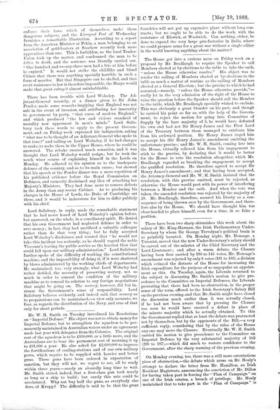Lord Salisbury, in reply, made the remarkable statement that he
had never heard of Lord Wolseley's opinion before, but answered, on the whole, in a conciliatory spirit. He denied that his own Government had neglected defence in order to save money ; in fact, they had sacrificed a valuable colleague rather than do that very thing ; but he fully accepted Lord Wolseley's disclaimer, and trusted that "he would not take this incident too seriously, as he should regard the noble Viscount's leaving the public service as the heaviest blow that could fall upon our military administration." Lord Salisbury further spoke of the difficulty of working the constitutional machine, and the impossibility of doing it, if it were shattered by blows administered by the working chiefs of departments. He maintained, too, very strongly, what Lord Wolseley had rather derided, the necessity of preserving secrecy, not so much in order to conceal the condition of the military machine as to conceal its relation to any foreign negotiations that might be going on. The secrecy, however, did but in- crease the Government's sense of responsibility. Lord Salisbury believes evidently, and indeed said, that secrecy as to preparations can be maintained,—a view only accurate, we fear, as regards the distribution of the Navy, and true of that only for short periods.


































 Previous page
Previous page